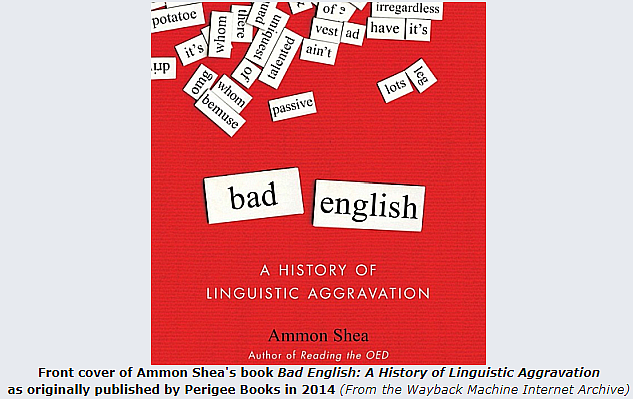In a sense, editors of business and journalistic prose are in the same league as medical doctors, surgeons, dentists, and chiropractors, who exist to treat the ailing, excise diseased body tissue, extract rotten teeth and fill up ugly cavities, or straighten fractured bones and limbs. The only difference is in the patients. Medical and health-care practitioners work on human bodies, while editors work on masses of thought that have congealed into words and strings of sentences. Perhaps in one out of 50, these masses of thought could be turned into decent, well-functioning prose by just compacting loose prose fiber, but the rest of the time they could be so maddeningly mixed up and obtuse as to defy the act of editing itself.

There are, in fact, moments when editors get the overpowering urge to kill off bad prose altogether as an act of mercy. Unfortunately, the only word surgeons on earth that can administer euthanasia on terminally ailing prose—and well they should—are the newspaper and magazine editors in both print and online. Those who must earn their keep as editors of business, professional, and academic prose couldn’t engage in such a cruel practice. They must keep their patients alive no matter what horrible shape or state they are in. Often, in fact, they must perform nothing less than acts of resurrection on prose that’s already perfectly dead or comatose.
The volume of bad prose churned out by our society every day is so huge that a competent editor need not fear losing his livelihood—only his patience and sanity. The syndrome thrives not so much on lack of research or enthusiasm of writers but on bad English, bad thinking, and plain mental laziness. It gnaws not only at newspaper and magazine reports and feature articles but more so at educational writing and academic dissertations, advertising, and business communication. There’s so little precision in thought and language—and not enough evidence of intellection and imagination—in not a few of the published works that fill up the tons of newsprint and book paper that roll out of the presses every day.
Take a look at this passage from a supposedly expert dissertation that was serialized sometime ago by one of the leading newspapers:
“The trend of an emerging economic and social world may be pushed backward by counterforces from within which may be national cultural traditions. Resistance and conflicts may continue to simmer under the thin veneer of nationalism and a myopic view of cultural traditions as a kind of motionless stonewall or a wrong historical sense focuses only on the remoteness of the past including the present… However, it is not unbridled license for an egocentric calculation and development of anti-axiological values and a resolute anti-establishment disposition of new world order heading for a global village.” Even after reading the passage five or six times, I still couldn’t fathom what profound insights about culture it was telling me, and I was willing to bet that probably only one of every 100 editors would. But the greater mystery was why the newspaper running the series had not bothered to do substantive editing on the incredibly obtuse and incomprehensible material, or at least to ask the authors to boil it down so more people can benefit from its wisdom.
A good number of print advertising in the newspapers, although written by professional copywriters, display the same unbelievable imprecision and nebulousness. Look at this doggerel used by a real estate ad for a picture of newlyweds:
“Is love forever? …I promise to cherish you to be there for always, to be your husband and your lover, your teacher, your friend as you are to me, and more…forever.” The profound question is never answered, and the problem with parsing and punctuation is so severe that it has rendered the passage practically meaningless.
The same recklessness in language is evident even in infomercials. Look at this photo caption of a leading cellular phone company, quoting a female chef endorsing the product:
“Motherhood by [brand name withheld]
is easier with my cooking schedule…keeps me in touch 24 hours a day 7 days a week." That really is weird, a cellular phone that has become a mother, and weirder still that the motherhood process could be made easier by one’s cooking schedule! I thus wonder if I should ask my wife to have her current mobile phone unit replaced by one of those fecund cell phones…”
Then, from one of those learning institutes that should have known better about language, here’s an ad copy for a course on corporate culture-building:
“Values are the most important glue that keep the organization together. Values determine the true worth of the company, as it reveals the nature of its people. Amidst the challenging milieu, upshots of values and culture, which are in constant motion, slowly define the distinctiveness of the organization. To forge commitment, is to discover the culture and what holds the people together in values.” Too bad that I was never able to figure out what that ad wanted to say, so I obviously had decided not to take that course at all.
------------------------
This essay first appeared in my English-usage column in The Manila Times
and subsequently formed Chapter 140 of my book Give Your English the Winning Edge
, ©2009 by Jose A. Carillo. All rights reserved. Read this essay and listen to its voice recording in
The Manila Times:
The age of imprecision(Next:
Keeping English prose trim and slim) March 21, 2024
Visit Jose Carillo’s English Forum, http://josecarilloforum.com. You can follow me on Facebook and X (Twitter) and e-mail me at j8carillo@yahoo.com.